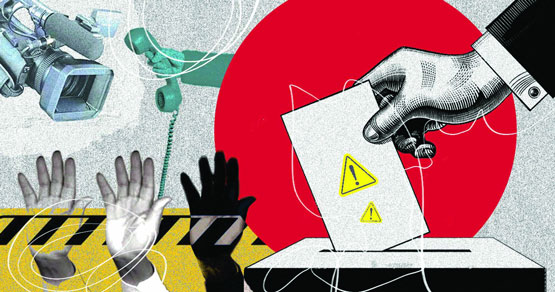Free, fair elections everyone’s duty
Ambassador Haas
Diplomatic Correspondent: US Ambassador to Bangladesh Peter Haas yesterdaysaid free and fair elections simply cannot take place in an environment with political violence, noting that ensuring free and fair elections is everyone’s responsibility.
“If any one of them fails to fulfill their responsibility or if any one of them prevents another from fulfilling their responsibility, free and fair elections would become nearly impossible,” he said.
It is important for everyone – demonstrators, political parties, the government, and law enforcement – to respect the rule of law and to refrain from violence, harassment, and intimidation, Haas said, making it clear that the United States “does not favor” any particular political party.
The US envoy made the remarks at the “Meet the Ambassador” event organised by the Centre for Governance Studies (CGS) in collaboration with Friedrich-Ebert-Stiftung (FES) Bangladesh at a city hotel. Representatives of political parties, academics, former diplomats and business leaders were present. CGS Chairman and chairman of the National River Protection Commission Manjur A Chowdhury, Resident Representatives of FES Bangladesh Felix Kobiz also spoke while the conversation was moderated by CGS Executive Director of CGS Zillur Rahman.
Ambassador Haas said the Election Commission, government, media, law enforcement agencies, civil society and political parties – everyone has an important role to play.
Ambassador Haas said the recent violent clashes at political rallies and demonstrations here in Bangladesh remind them of this fact.
He said the promotion of democracy is particularly relevant as Bangladesh looks toward the upcoming parliamentary elections.
“What we want is a free and fair election conducted in accordance with international standards where the people of Bangladesh can freely choose their own government.
Talking further on the elections, he said, “I keep saying free, fair and transparent elections in accordance with international standards. I am happy to add inclusive on it.”
Haas noted that the number of extrajudicial killings has significantly changed since the sanctions imposed in December last year which he sees as a very good signal.
He said the sanctions imposed by the US against RAB and seven of its former and current officials are not intended to punish but to change the behavior and hold them accountable.
The US touched upon various aspects of Bangladesh-US relations including trade, labour rights, regional and global politics, and Indo-Pacific Strategy.
Bangladesh has made remarkable progress in terms of workplace safety in the export-oriented industries, he said, adding that the US still has concerns in the area of labour rights.
Responding to a question, Ambassador Haas said there has been no change in their policy and sanctions are still in place.
And, he said, sanctions will remain in place until there has been accountability and reform.
“We are looking for accountability for the past incidents,” said the US envoy.
Several journalists also asked about the USA’s views on India’s decision to buy energy from Russia and Bangladesh’s stance on the BRI and other issues.
The ambassador expressed that many have misconceptions about the US sanction on Russia where oil, gas, and agricultural products are not part of the sanction.
Also, he said the BRI issue is Bangladesh’s decision to make and the US has no say in it.
Rare Israeli airstrike in Beirut kills Hezbollah commander and more than a dozen others
International Desk: Israel launched a rare airstrike that killed a senior Hezbollah milita…








